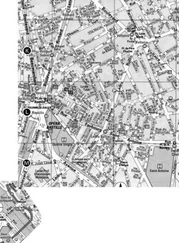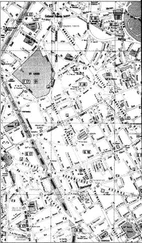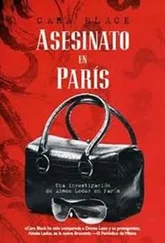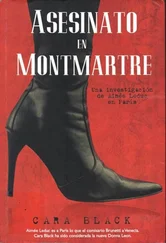Then a cry. René’s cry. And the line went dead.
Nervous, she tried Léo.
“ Allô, Léo?” she said. “Could you locate it?”
“In five seconds?” Léo said, her voice sleepy. “The Northeastern sector antenna responded; he’s in Paris. Keep him on longer next time.”
“Merci, ” Aimée said, pacing the worn wood floor.
Thursday Morning
AIMÉE WOKE AT 6 A.M. to darkness, her shoulders and legs stiff.
Twelve hours had passed since the first kidnappers’ call. She had to get to work. Morbier snored in his back bedroom. Sophie lay asleep, after a night of twisting and turning on the couch. But she had no fever, hadn’t thrown up.
Aimée wrote “Call me when you wake up” on a graph-lined piece of paper and put it on Morbier’s kitchen table.
She swallowed her pills with an espresso at the corner café on Morbier’s street and made it to her apartment, changed into a black leather skirt and long pullover. She walked an eager Miles Davis on the fog-lined quai, then dropped him at the groomers’ for a much-needed trim.
Aimée tried Gassot’s number again but it rang and rang. Frustrated, she wanted to beat her head against the stone wall. So far, she was spinning her wheels in the sand.
On her calendar the day was circled in red . . . payday. Time for René’s paycheck. All over France, veterans and retirees collected their pensions. Most banked at their post office accounts.
That’s where Gassot would be! Too bad her bike had been stolen. She jumped on the Number 74 bus to Clichy, passing old ladies walking their chichiteux dogs in front of bourgeois gray Haussmann buildings.
Aimée knew the Clichy area, boasting bigger apartments, was about to become the next “in” place. It was becoming sprinkled with avant-garde boutiques whose back windows overlooked the trainyard, with newcomers who could ignore that water wasn’t connected to the main around the clock, and the fact the quartier had been “in” once before, then out. Far, far out.
Here Degas and Zola had argued at Café Guerbois, over Zola’s infamous article on the Salon that had refused Manet’s painting of Nana, a courtesan. Now the café was a Bata shoe store.
The rail lines, a symbol of modernity and access to the lush countryside for the Impressionists, were now grimy and soot-encrusted and the countryside better known for cinderblock HLM low-rent council housing. Place de Clichy’s former 1930s showcase Gaumont cinema had become the 1970s do-it-yourself Castorama hardware store.
Aimée left the bus. Her shoulders slumped when she saw the line at the post office trailing out the door. How could she find one particular veteran in a sea of old faces?
She took a black marker and on an envelope wrote “Hervé GASSOT, anciens combattants, ” as she’d seen done at the airport.
On her third trip walking the line, an old woman tugged at her sleeve. “What’s he done?” she asked.
Aimée noted the sixtyish woman’s white hair held in place by a hairband, the tailored winter-white wool coat with dirty, too short sleeves, scuffed 70s Courrèges patent leather ankle boots.
“Nothing yet,” Aimée said. “Can you help me?”
The woman shrugged and looked away.
“Feel like a coffee?” Aimée asked.
“ Un demi’s more my style,” she said.
“ Bon ,” said Aimée. “Let’s go. My treat.”
They ended up across the street in a working class café facing Avenue de Saint Ouen. Aimée tapped her chipped nails on the zinc counter as the old woman knocked back a beer and then another.
“Alors, Madame, have you seen Hervé Gassot?”
The green jockeys’ jerseys flashed on the mounted télé above the bar. Besides them, the espresso machine whined as it steamed milk and a line of drab raincoated commuters waited to purchase the November Carte Orange pass or a phone card. Aimée could use both.
“I see him around. Plays cards.”
“So you know Gassot well?”
“Who knows anyone well? That’s relative, n’est-ce pas?” she said. A slight white froth edged her lip. “The Existentialists would argue that we can never know anyone, really.”
“D’accord, ” Aimée agreed.
But it was her franc and she didn’t care to discuss philosophy. She wanted to know about Gassot. On top of it, this lady in white didn’t smell all that fragrant.
“So you’ve seen him around?” Aimée said. “What about today in line at the poste?”
“I’m still thirsty.”
Aimée nodded to the barman to give her another.
“He came early.”
She pushed the holder with boiled eggs toward the woman.
“Try one, tastes good with a demi ,” she said, noticing the tremor in the woman’s hands. Her thin legs.
The woman cracked the egg. With effort, she peeled the eggshell. Bits of white shell sprinkled on the floor. She took small bites and chewed slowly, each bite measured.
Aimée had a sinking feeling that this was the woman’s meal for the day. A loud ringing sounded in the woman’s pocket. She pulled out an alarm clock, white and oblong, with large numerals on it.
“Time for my scrub,” she said. “Wonderful hot showers at the municipal pool.”
“So where does Gassot play cards?”
“He cheats, you know.”
Aimée hid her smile. “ Alors , Madame,” she said. “Can’t you help me?”
“I’ve seen him in the square,” she said, shrugging.
“What does he look like?”
She pointed to an older man leaning against the counter, drinking a verre ; white haired, stocky. Like a lot of older men in the quartier. The woman shrugged.
Aimée figured the old woman was hungry and needed a drink, that’s all. But Aimée didn’t begrudge her the food. She put some francs on the counter, stood, and hitched her bag onto her shoulder.
“But Gassot’s peg-leg gave him trouble today,” the woman told her.
At last! Aimée paused and leaned closer to the old woman, hoping gentle prodding would elicit more information.
“You mean he has an artifical limb?”
“He limped more than usual,” she said. “Might get a new one, since he cashed his pension today.”
“An injury from the Indochinese war?” she asked.
“Wouldn’t surprise me.”
“He was an engineer, wasn’t he?”
She raised her eyebrows. “Talked about oil drilling. How he couldn’t do that anymore with his pegleg. Worked with drawings.”
“ Merci , Madame . . . ?”
“Madame Lorette,” she said. Her eyes changed. “Sorry, I haven’t helped you much.”
Did she notice the pity in Aimée’s gaze?
“Look at my hands. You wouldn’t know it, but once I was a concert pianist. Schubert was my forte. I even played at the Châtelet concert hall.”
Did this woman have someone to help her? “Do you have family?”
“I wasn’t a very good mother,” she said. “Some women shouldn’t have children. And my daughter knew that.”
“Maybe so, Madame Lorette,” Aimée said. “But children eventually get on with their life.”
Aimée felt a pang of sorrow. Had her own mother felt that way? For a moment she wished her mother was sitting in some faraway café thinking about her, knowing guilt like this woman. Whenever she’d asked her grand-père about her mother, he’d sigh and shake his head. “ Ma petite , some women aren’t meant to be understood. Just to be loved.”
And in an odd way, she did understand, had no choice but to accept it. But deep down, a part of her waited for the mother who’d left one day without explanation. A woman who’d gone to fight revolutions and change the world, but left a little part of it incomplete.
Читать дальше











